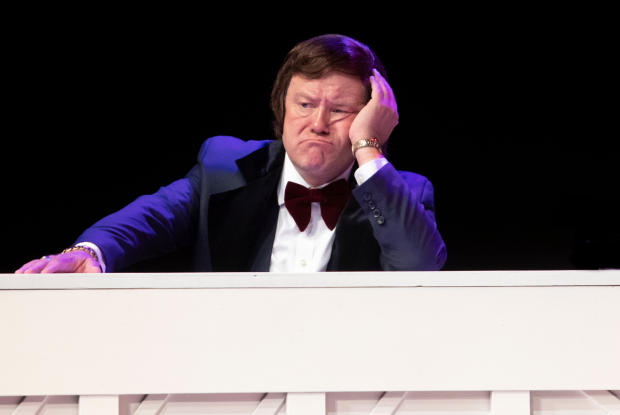”Les Dawson: Flying High” at Assembly George Square – Edinburgh Fringe review

There’s a rich seam of nostalgia for comedians of the past that has emerged on the Edinburgh Fringe in recent times. Now, hot on the heels of shows celebrating and commemorating Frankie Howerd, Kenneth Williams and Eric Morecambe, comes Les Dawson, best known as the rubber-faced, lugubrious host of Blankety Blank.
I loved Dawson, a fellow Lancastrian with a rich love of words, and part of the pleasure of this one-man show from impressionist Jon Culshaw, of Dead Ringers fame, is the sheer joy of being back amongst Dawson’s jokes and hearing – with uncanny accuracy – the voice that asks us to travel back through “the fecund loam of our collective consciousness” to remember someone who died in 1993.
But this is more than a simple turn. Written by Tim Whitnall and directed by Bob Golding, the team that scored such a success with Morecambe in 2009, the piece imagines Dawson beginning to dictate his memoirs while flying on Concorde for a rare New York gig. This both provides the opportunity for some gags – “Oh look, there’s Joan Collins, dashing to New York to attend the birth of her next husband” – and a frame for Dawson to look back, philosophically, on his life.
There’s a lot to remember. Born into poverty – “a gaslit hovel so decrepit the cockroaches go round on stilts” – he had disastrous careers as a door-to-door salesman and as an electrician who blew up a street when he rewired a jukebox, then played piano in a Paris brothel, before finding fame on Opportunity Knocks at the late age of 36.
All of which is recounted here, on a set featuring a giant television screen which allows Culshaw as Dawson to watch himself imitating other great showbiz figures of the time including Alan Whicker, Hughie Green, and Dawson’s own comic creation Cissie in gossipy conversation with Roy Barraclough’s Ada, full of double entrendres and joyful misunderstandings.
All the impressions are, as you would expect, superb; Culshaw as Dawson wonderfully catches not only the gurning face and the little moues of satisfaction when a good gag lands, but also that deep drop of the voice that the comic employed to add to the effect.
But what’s appealing about Flying High is the way in which it winds the comedy into a heartfelt examination of the sources of Dawson’s appeal – his obsession with words and the way they work, the essential good nature of his humour, the truthfulness of so many of his observations of life.
Goodness knows what the younger members of the audience made of it all, but the show’s final appeal for kindness in a difficult, hard-knocks world, feels strangely moving, an echo from a more innocent past to an ever more complicated present.












